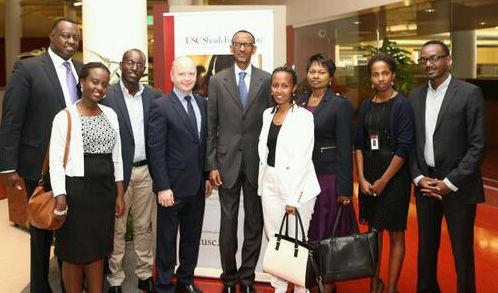President of Rwanda Paul Kagame Visits USC Shoah Foundation

President Paul Kagame visited USC Shoah Foundation on Wednesday to learn more about the Institute’s work linking testimony, technology and education.
USC Shoah Foundation conducts its work in 30 countries, including Rwanda, where the Institute is involved in three testimony-based programs to inspire Rwandans to strengthen social cohesion and promote positive values, empathy, and critical thinking so as to advance the country’s peacemaking and reconciliation efforts.
Since 2007, the Institute has been working in Rwanda with Aegis Trust, the Kigali Genocide Memorial Centre and other local partners to gather testimonies as part of the Rwanda Archive and Education Program. The program encompasses teacher training, classroom pilot programs, archive building at the Kigali Genocide Memorial Centre, and pioneering peace education content based on testimony. Three Aegis Trust staff members are currently at the USC Shoah Foundation offices in Los Angeles for two-month stay and exchange of expertise, including training on indexing methodology and archive building to record, index and preserve testimonies of Rwandan Tutsi Genocide survivors in the future.
To date, the USC Shoah Foundation has integrated 65 testimonies from survivors and witnesses of the 1994 Rwandan Tutsi Genocide into its Visual History Archive, of which 50 are from the Aegis Trust and Kigali Genocide Memorial Centre. Additional testimonies will be added in the future.
IWitness in Rwanda is a multimedia-learning platform that introduces testimony to teachers and their students by engaging them in technology. IWitness in Rwanda enables students to better understand genocide, its causes, and global context; it delivers knowledge in core subjects such as history, civics, and language arts; and it builds 21st century digital literacy and skills. The program includes both Holocaust and Rwandan testimonies in Kinyarwanda and English.
The first in-classroom pilots of IWitness in Rwanda are currently underway in schools around Kigali. The pilots are part of the second phase of the IWitness in Rwanda project, a joint effort between USC Shoah Foundation, Aegis Trust and Kigali Genocide Memorial (KGM) that is funded by the UK’s Department for International Development (DFID) to bring IWitness into Rwandan secondary schools.
The Rwanda Peace Education Program is a three-year program under the auspices of Aegis Trust, funded by the Swedish International Development Cooperation Agency (Sida) that brings together the expertise of The Institute of Research and Dialogue for Peace (IRDP), Radio La Benevolencija and USC Shoah Foundation and their collective experience in peace media, dialogue, debate, developing community leaders and integrating memory, testimony and documentation into peace education to achieve significant and lasting behavioral change in Rwanda.
This summer the USC Shoah Foundation will also be conducting its second university-level course in partnership with USC Dornsife’s Problems Without Passports program that combines problem-based and inquiry learning research exercises with study in a foreign country. The course, “Conflict Resolution and Peace Research,” will allow students to study the history, genocide, aftermath and creation of modern day Rwanda. This course immerses students in the complexities of socio-political reconstruction after genocide.
USC Shoah Foundation executive director Stephen Smith is executive producer of Rwanda’s Kwibuka20, a series of events nationwide leading up to the 20th commemoration of the Rwandan Tutsi Genocide on April 7, 2014.
(Left to right in the photo above: Eugène Gasana, Permanent Representative to the United Nations; Aude Kamanzi, staff member of Aegis Trust; Medy Kimenyi, staff member of Aegis Trust; Stephen Smith, USC Shoah Foundation Executive Director; President Paul Kagame; Edith Umugiraneza, USC Shoah Foundation staff; Mathilde Mukantabana, Ambassador of Rwanda to the U.S.; Consolée Uwamariya, USC Shoah Foundation staff; Paul Rukesha, staff member of Aegis Trust)